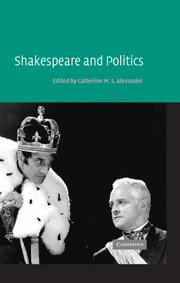Book contents
- Frontmatter
- Contents
- List of contributors
- Editor's note
- 1 Shakespeare and politics: an introduction
- 2 Shakespeare and politics
- 3 Henry VIII and the deconstruction of history
- 4 Livy, Machiavelli, and Shakespeare's Coriolanus
- 5 Richard II and the realities of power
- 6 Plutarch, insurrection, and dearth in Coriolanus
- 7 Some versions of coup d'état, rebellion, and revolution
- 8 Language, politics, and poverty in Shakespearian drama
- 9 ‘Demystifying the mystery of state’: King Lear and the world upside down
- 10 Venetian culture and the politics of Othello
- 11 The Bard and Ireland: Shakespeare's Protestantism as politics in disguise
- 12 Henry V as working-house of ideology
- 13 ‘Fashion it thus’: Julius Caesar and the politics of theatrical representation
- 14 Take me to your Leda
- 15 Macbeth on film: politics
- 16 William Shakespeare's Romeo + Juliet: everything's nice in America?
- Index
12 - Henry V as working-house of ideology
Published online by Cambridge University Press: 05 June 2012
- Frontmatter
- Contents
- List of contributors
- Editor's note
- 1 Shakespeare and politics: an introduction
- 2 Shakespeare and politics
- 3 Henry VIII and the deconstruction of history
- 4 Livy, Machiavelli, and Shakespeare's Coriolanus
- 5 Richard II and the realities of power
- 6 Plutarch, insurrection, and dearth in Coriolanus
- 7 Some versions of coup d'état, rebellion, and revolution
- 8 Language, politics, and poverty in Shakespearian drama
- 9 ‘Demystifying the mystery of state’: King Lear and the world upside down
- 10 Venetian culture and the politics of Othello
- 11 The Bard and Ireland: Shakespeare's Protestantism as politics in disguise
- 12 Henry V as working-house of ideology
- 13 ‘Fashion it thus’: Julius Caesar and the politics of theatrical representation
- 14 Take me to your Leda
- 15 Macbeth on film: politics
- 16 William Shakespeare's Romeo + Juliet: everything's nice in America?
- Index
Summary
Among the features specific to the text of Henry V its apparent property of giving rise to particularly acrimonious division of opinion has often been noted. To say that there are two camps sharply opposing each other is indeed almost a commonplace of critical literature, the one camp fervently applauding what they see as a panegyric upon, indeed a rousing celebration of, ‘the mirror of all Christian Kings’ and most successful English monarch of all the histories; and the followers of the other camp deriding with no less conviction the exaltation of a machiavellian conqueror in a rapacious and, after all, senseless war. Little wonder, then, that in 1939 Mark Van Doren should have thought even Shakespeare's genius baffled vis-à-vis such hopeless material; that E. M. W. Tillyard should have considered Henry V, remarkably enough at the time of the Second World War, a dramatic failure on account of its puerile patriotism and lack of form; or that Moody E. Prior should consider the play ‘a theatrically handsome fulfillment of an obligation, performed with skill but without deep conviction’.
- Type
- Chapter
- Information
- Shakespeare and Politics , pp. 198 - 205Publisher: Cambridge University PressPrint publication year: 2004
- 1
- Cited by

